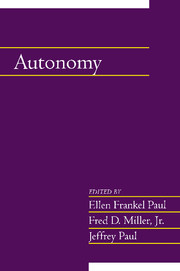Book contents
- Frontmatter
- Contents
- Introduction
- Acknowledgments
- Contributors
- Stoic Autonomy
- Autonomous Autonomy: Spinoza on Autonomy, Perfectionism, and Politics
- Kant on the Theory and Practice of Autonomy
- How Much Should We Value Autonomy?
- Autonomy, Duress, and Coercion
- Autonomy and Hierarchy
- Reason and Autonomy
- Identification, the Self, and Autonomy
- Some Tensions between Autonomy and Self-Governance
- Autonomy from the Viewpoint of Teleological Behaviorism
- The Paradox of Group Autonomy
- Abortion, Autonomy, and Control over One's Body
- Freedom as a Political Ideal
- Index
Freedom as a Political Ideal
Published online by Cambridge University Press: 06 July 2010
- Frontmatter
- Contents
- Introduction
- Acknowledgments
- Contributors
- Stoic Autonomy
- Autonomous Autonomy: Spinoza on Autonomy, Perfectionism, and Politics
- Kant on the Theory and Practice of Autonomy
- How Much Should We Value Autonomy?
- Autonomy, Duress, and Coercion
- Autonomy and Hierarchy
- Reason and Autonomy
- Identification, the Self, and Autonomy
- Some Tensions between Autonomy and Self-Governance
- Autonomy from the Viewpoint of Teleological Behaviorism
- The Paradox of Group Autonomy
- Abortion, Autonomy, and Control over One's Body
- Freedom as a Political Ideal
- Index
Summary
INTRODUCTION
I shall assume that a well-ordered state is one that promotes the freedom of its subjects. My question is what is the kind of freedom that the state ought to promote? This question is different from the question of what freedom is. It might be thought, for example, that freedom consists in the autonomous pursuit of valuable goals and projects, but that the state cannot directly promote this freedom. On this view, the state would not be able to make its citizens free. However, it might be able to do things that make it easier or more likely for them to be free. The freedom that the state promotes might be merely an aspect of or a condition for the freedom that really matters.
A political ideal of freedom tells us what kind of freedom the state ought to promote. If the ideal is sound, and if a state successfully promotes the kind of freedom that this political ideal identifies, then the state will have done all that it can do to promote the freedom of its subjects, even if some of its subjects remain substantially unfree. My purpose in this essay is to articulate and defend a particular ideal of political freedom. This ideal holds that the state ought to promote and sustain an environment in which its subjects are best able to carry out their plans and to form new ones.
- Type
- Chapter
- Information
- Autonomy , pp. 307 - 334Publisher: Cambridge University PressPrint publication year: 2003
- 3
- Cited by



